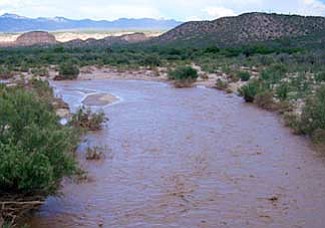Guest Viewpoint: A Win-Win Water Settlement for Arizona
Water is and always will be our most precious resource in the Southwest. Control of water rights has fueled seemingly endless and intractable disputes among competing interests.
That's why resolving water rights claims is so important. It is surely one of the most challenging and satisfying issues that I have worked on as a Senator. Each settlement involves long hours and tough negotiations, with the final step being legislation that legally affirms the agreement.
It now appears as if parties in Arizona have come together to settle yet another claim.
I have introduced legislation that would resolve major water claims in the state and provide a reliable source of drinking water to the White Mountain Apache Tribe.
The White Mountain Apache Tribe Water Rights Quantification Act would authorize and confirm the tribe's water settlement and authorize funding for a key drinking water project on the tribe's reservation in northeastern Arizona called the Miner Flat Project.
Under the settlement, the tribe's water claims are resolved by allocating it a total annual water right of 52,000 acre-feet, per year, through a combination of both surface water and Central Arizona Project (CAP) water.
Without a settlement, resolution of the tribe's claims would take many years, entail great expense, prolong uncertainty concerning the availability of water supplies in the Phoenix metropolitan area, and seriously impair the long-term economic well-being of all of the parties to the settlement.
A major factor driving the settlement is the drinking water needs of the White Mountain Apache Tribe. Currently, a relatively small well field serves most of the tribe's residents, but production from the wells has declined significantly over the last few years. As a result, the tribe has experienced summer drinking water shortages. The tribe is planning to construct a relatively small diversion project on the North Fork of the White River on its reservation this year. That will replace most of the lost production from the existing well field; however, it will not produce enough water to meet the demand of the tribe's growing population. The Miner Flat Project will provide a long-term solution for the tribe's drinking water needs.
A significant percentage of the water and funding for the White Mountain Apache settlement has already been set aside in legislation I previously authored called the Arizona Water Settlements Act, which became law in 2004. It settled lengthy litigation concerning the Gila River Indian Community's rights to water from the Gila River, and resolved claims of the Tohono O'odham Nation for damages from groundwater pumping in southern Arizona. It also set aside 67,300 acre-feet of CAP water per year to resolve future Indian water claims in Arizona and established a $250 million fund for future Arizona Indian water settlements, such as the White Mountain Apache settlement.
Arizona has a history of successfully resolving its Indian water claims. The White Mountain Apache settlement is another example of Arizona water users' ability to reach agreement on complex issues involving competing interests from the federal government, tribes, and public and private water users within Arizona. And, like all water settlements, this one is the product of several years of negotiation, patience, and just plain hard work of the parties involved. I will work hard to see that it is approved by Congress.
(U.S. Senator Jon Kyl is the Assistant Republican Leader and serves on the Senate Finance and Judiciary committees. Visit his website at
www.kyl.senate.gov.)
SUBMIT FEEDBACK
Click Below to:




